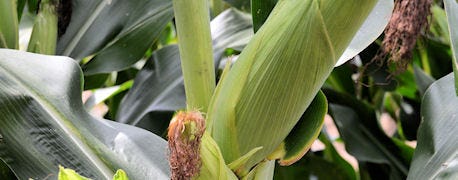August 28, 2014

Northern New York corn growers expect notably higher than average corn yields this fall, assuming their on-farm trial plots are correct. That's the early take from research trials funded by the farmer-driven Northern New York Agricultural Development Program.
Now, farmers wonder if Cornell University's nitrogen fertilizer and manure application recommendations need revising. Twelve northern New York farms teamed with Cornell researchers, Cooperative Extension field crop specialists and regional crop consultants to find answers to two questions:

EARS APLENTY: This year, many Northeast cornfields are sporting many plants with two complete ears per plant. It causes farmers to wonder about next year's N rates.
Does high crop productivity means more N needs to be supplied to replace that taken up by the corn? Or are new corn varieties simply able to make better use of the nitrogen already in the soil?
New York corn silage and corn grain yields have increased steadily over the past 40 years. For many sites, the corn yield potentials in the Cornell soil database are in line with actual yields, says research leader Quirine M. Kettering, director of Cornell's Nutrient Management Spear Program
Tracking yield potential
Ongoing research is investigating the impact of soil type, drainage, and management on corn N needs. Kettering adds that new adaptive management protocol is under evaluation that allows producers to exceed current Cornell University N guidelines.
Farmers are using N application rates based on either the results of two years of on-farm replicated trials. Or they're based on actual yield measurements plus the results of the corn stalk nitrate test and other tests such as the Illinois Soil Nitrogen Test to indicate N needs field-by-field.
Check out the complete Evaluation of Yield Potentials of Corn Grain and Silage in Northern New York to Improve Crop Production, Nutrient Recycling and Environmental Protection report online at www.nnyagdev.org .
You May Also Like




